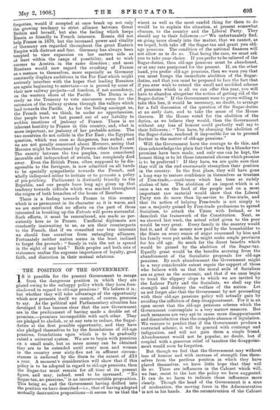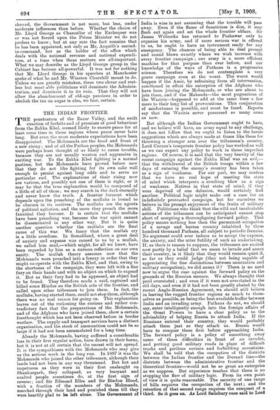:THE -POSITION OF THE GOVERNMENT.
Pit possible for the present Government to escape from the dangerous position in which they are placed owing to the unhappy policy which they have fore- shadowed in regard to old-age pensions ? We believe it is ; but whether they will take advantage of the opportunity Which now presents itself we cannot, of course, presume to say. As the political and Parliamentary situation has developed it has become clear that the new Government are In the predicament of having made a double set of promises,—promises incompatible with each other. They are pledged to abolish, or• at any rate to reduce, the Sugar- duties at the _first possible opportunity, and they have also pledged themselves to lay the foundations of old-age pensions, foundations upon which is to be gradually raised a universal system. . We are to begin with pensions on. a small scale, but as more money can be obtained they are to be extended .until every man and woman in the country over sixty-five not in affluent circum- stances is endowed by the State to the extent. of £13 a year: A moment's consideration will show that if this policy is to be adopted in regard to old-age pensions, then the Sugar-tax must remain for all time at its present figure, -and may, indeed, need to be increased. "No Sugar-tax, no pensions," is an incontrovertible proposition. This being so, and the Government having drifted into the position we have described—i.e., that of having adopted mutually destructive propositions—it seems to 'us that the wisest as well as the most candid thing for them to do would be to explain the situation, at present somewhat obscure, to the country and the Liberal Party. They should say to their followers :—" We unfortunately find, on going more closely into the matter, that we -cannot, as we hoped, both take off the Sugar-tax and grant you old- age pensions. The condition of the national finances will not allow us to do so. . That beinc, the case, we must ask you to take, your choice. If you prefer to be relieved of the- Sugar-duties, then old-age pensions must be abandoned, or at any rate postponed for the present. If, on the other" hand, you prefer old-age pensions, then we warn you-that you must forego the immediate abolition of the Sugar duties, and that you must be prepared to face the fact that if you ever wish to extend the small and modified scheme of pensions which is all we can offer this year, you viill have to abandon altogether the notion of getting rid of the Sugar-duties." If the Government were to prove willing to take this line, it would be necessary, no doubt, to arrange for a full discussion of the question of the Sugar-duties at an early date, and to take the sense of the House thereon. if the House voted for the abolition of the duties, as we believe they would, then the Government without any loss of honour could perfectly well say to their followers : "You have, by choosing the abolition of the Sugar-duties, rendered it impossible for us to proceed further in the matter of old-age pensions."
Will the Government have the courage to do this, and thus acknowledge the plain fact that when by a blunder two promises have been made, and only one can be kept, the honest thing is to let those interested choose which promise is to be preferred ? If they have, we are quite sure that they will in the end enormously strengthen their position in the country. In the first place, they will have gone a long way to restore confidence in themselves as trustees of Free-trade,—conlideuce which has been so rudely shaken of late. The abolition of an impost which is at once a tax on the food of the people and on a most important raw material would show that the Liberal Party can do more than lip-service to Free-trade, and that its notion of helping Free-trade is not simply to use a. majority gained by Free-trade professions to spread Socialism, to attack the Union with Ireland, or to demolish the framework of the Constitution. Next, as we showed last week, the actual relief given to the poor would be very great. Every family in the country would feel it, and if the money now paid by the householder to the State on every ounce of sugar consumed by him and his family were put aside, he might make ample provision for his old age. So much for the direct benefits which would be gained by the abolition of the Sugar-tax: Equally great would be the benefits accruing from the abandonment of the Socialistic proposals for old-age pensions. By such abandonment the Government might to a very considerable extent regain the support of those who believe with us that the moral evils of Socialism are as great as the economic, and that if we once begin to tread the slippery slope to which we are invited by the Labour Party and the Socialists, we shall sap the strength and. destroy the welfare of the nation. Let us not forget also that the Government by-not proceeding with their old-age pensions policy will actually' gain by avoiding the infliction of deep disappointment. For it is an open secret that the old-age pensions scheme which 'the Government contemplate is a very narrow measure. But such measures are very apt to cause more disappointment and dissatisfaction than the complete absence of legislation. We venture to predict that if the Government produce a restricted -scheme, it will be greeted with contempt and. indignation, and will not gain them a single friend. Abandonment would not be popular, no- doubt, but if coupled with a generous relief of taxation the disappoint- ment would soon be forgotten.
But though we feel that the Government may withont loss of honour and with increase of strength free them- selves from the perilous position in which they have placed themselves, we have little hope that they will do so. There are influences in the Cabinet which Will, we fear, resist to the last .the policy we have suggested. It can do no harm to indicate those influences more clearly. Though the head of the Government is a Man of moderation, the moving force in the Administration is not in his hands. As the reconstruction of the Cabinet showed, the Government is not more, but less, under moderate influences than before. Whether the choice of Mr. Lloyd George as Chancellor of the Exchequer was or was not forced upon the Prime Minister we do not profess to know ; but at any rate the fact remains that he has been appointed, not only as Mr. Asquith's second- in-command, but as the holder of the office which deals with the national revenue and national expendi- ture, at a time when these matters are all-important. What we may describe as the Lloyd George group in the Cabinet has become all-powerful. It was not for nothing that Mr. Lloyd George in his speeches at Manchester spoke of what he and Mr. Winston Churchill meant to do. Unless we are greatly mistaken, these two clever and rest- less but most able politicians will dominate the Adminis- tration, and dominate it to its ruin. That they will not allow the abandonment of old-age pensions in order to abolish the tax on sugar is also, we fear, certain.









































 Previous page
Previous page